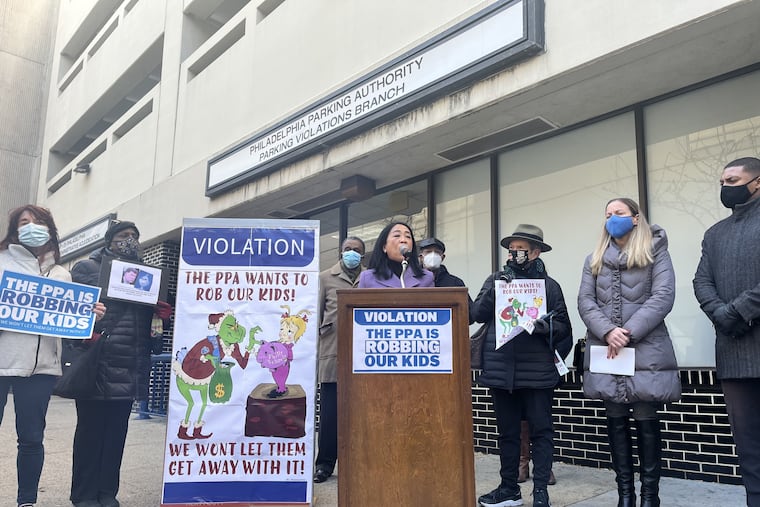Philly public school advocates call for PPA to drop $11 million debt against School District and more financial oversight
The parking authority says it needs to claw back that money after recently learning that it miscalculated its own pension costs two years ago.

A group of public school advocates on Monday demanded the Philadelphia Parking Authority cancel an $11.3 million debt it has lodged against the city’s School District and called for more city oversight of what they describe as the financially reckless agency.
The parking authority says it needs to claw back that money after recently learning that it miscalculated its own pension costs two years ago, which would have dramatically lowered the authority’s $14.3 million contribution to the Philadelphia School District for the 2020 fiscal year.
Outside the PPA payment center in Center City on Monday, Councilmember Helen Gym and other school funding advocates held up signs likening the PPA to the Grinch — Dr. Seuss’ snub-nosed gremlin who steals from children on Christmas.
“Two years ago, they made a mistake, and now they want their money back from Philadelphia school kids,” Gym said.
PPA spokesperson Marty O’Rourke said that canceling the debt would violate government accounting standards, but that the authority “will continue to work with the District and City on how this issue will be resolved.”
Since 2004, the PPA has been required to pay the majority of its on-street parking revenues to the city. That payout is capped at a certain amount, and whatever is leftover goes to the School District, which in past years has ranged from $0 to more than $15 million.
The PPA contributed $0 to the district for the last fiscal year, due to the pandemic eviscerating on-street parking revenues. The alleged overpayment occurred the year prior to that — even though it was only realized recently.
» READ MORE: PPA tells the cash-strapped Philadelphia school district to pay back $11.3 million
Notably, the PPA’s miscalculations that year did not impact the PPA’s payment to the city. Mayoral spokesperson Kevin Lessard said the agency distributed the city the maximum capped amount for the 2020 fiscal year, and the increased costs claimed by the PPA only impacted the leftover amount that is earmarked for the district.
Advocates and the School District dispute the PPA’s claim that increased pension liabilities should be factored into the agency’s annual contribution to the perennially cash-strapped district.
Gym accused the parking authority of “plowing” additional expenses under the on-street revenue expense category to reduce its annual obligation to the School District. Emails obtained by The Inquirer show the PPA could not provide data to support its position that the late pension obligations had an effect on the authority’s financial commitment to the district.
O’Rourke said pension expenses have “consistently been factored into the calculation of the PPA payment to the School District,” as outlined in government accounting regulations.
O’Rourke said the PPA retained accounting firm Boyer & Ritter LLC to conduct a review of the agency’s financial standing in March 2018, and the pension cost obligations came to light through their years-long audit.
Advocates cast the $11.3 million discrepancy as the latest in a string of misleading financial maneuvers by the authority. In 2014, the PPA promised that a 50-cents-per-hour parking rate increase would net the School District millions in additional revenue. Instead, the PPA’s annual contributions plummeted.
“It’s hypocrisy,” Donna Cooper, executive director of the child advocacy group Children First, said of the agency’s refund demand to the School District. “This is financial mismanagement 101.”
Calling for more accountability, Gym proposed an annual review of the PPA’s budget, conducted by either the mayor’s administration or Council, similar to other city agencies. O’Rourke did not say whether the agency would agree to that, noting the PPA posts its proposed budget online every year, along with its contractors’ audits.
Outside audits probing the PPA’s finances have generated plenty of controversy.
In the last five years, the PPA has been audited by two outside government agencies, which identified a trail of misconduct, financial missteps, and other long-entrenched problems, including overpaid executives and a glut of patronage hires.
The PPA’s revenue-sharing formula, which is codified in state law, has also come under fire.
A 2017 audit from the Pennsylvania auditor general called the current funding formula an “immense detriment” to the School District and its students, as it only receives the leftover dollars while the city receives a fixed amount.
The audit also found the PPA had “a continual lack of communication” about payments that resulted in errors over a five-year period.